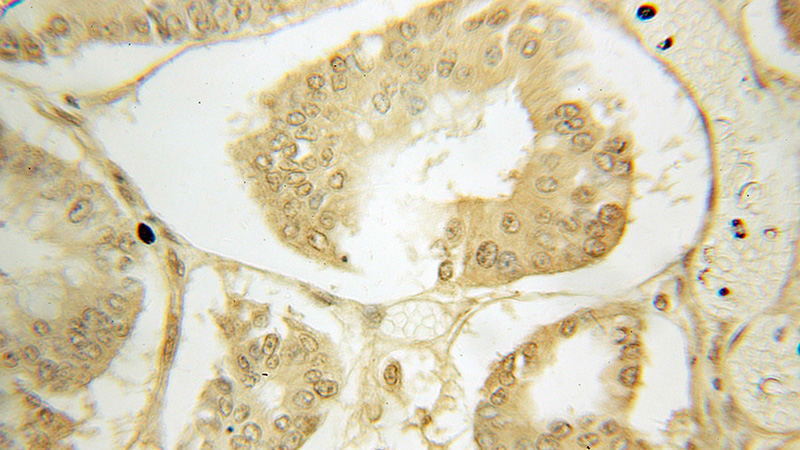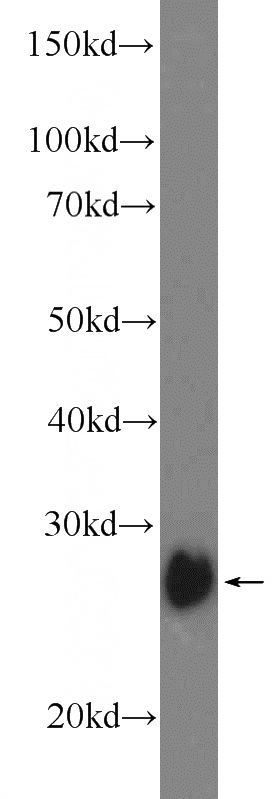-
Product Name
TPK1 antibody
- Documents
-
Description
TPK1 Rabbit Polyclonal antibody. Positive IP detected in mouse kidney tissue. Positive WB detected in mouse kidney tissue, HEK-293 cells, human small intestine tissue, L02 cells, mouse small intestine tissue, mouse testis tissue. Positive IHC detected in human colon cancer tissue, human kidney tissue. Observed molecular weight by Western-blot: 28 kDa
-
Tested applications
ELISA, IHC, WB, IP
-
Species reactivity
Human,Mouse,Rat; other species not tested.
-
Alternative names
HTPK1 antibody; Placental protein 20 antibody; PP20 antibody; thiamin pyrophosphokinase 1 antibody; Thiamine pyrophosphokinase 1 antibody; TPK1 antibody
-
Isotype
Rabbit IgG
-
Preparation
This antibody was obtained by immunization of TPK1 recombinant protein (Accession Number: BC014552). Purification method: Antigen affinity purified.
-
Clonality
Polyclonal
-
Formulation
PBS with 0.1% sodium azide and 50% glycerol pH 7.3.
-
Storage instructions
Store at -20℃. DO NOT ALIQUOT
-
Applications
Recommended Dilution:
WB: 1:500-1:5000
IP: 1:200-1:2000
IHC: 1:10-1:100
-
Validations

Immunohistochemical of paraffin-embedded human colon cancer using Catalog No:116266(TPK1 antibody) at dilution of 1:10 (under 10x lens)

mouse kidney tissue were subjected to SDS PAGE followed by western blot with Catalog No:116266(TPK1 Antibody) at dilution of 1:1000

IP Result of anti-TPK1 (IP:Catalog No:116266, 4ug; Detection:Catalog No:116266 1:500) with mouse kidney tissue lysate 4000ug.
-
Background
TPK1(Thiamin pyrophosphokinase 1) is also named as PP20(placental protein 20) and belongs to the thiamine pyrophosphokinase family. It is a cellular enzyme involved in the regulation of thiamine metabolism and catalyzes the conversion of thiamine, a form of vitamin B1, to thiamine pyrophosphate (TDP, or TPP). There is no difference in TPK1 expression in cultured fibroblasts from normal subjects or from patients with thiamine-responsive megaloblastic anemia(PMID:11342111). It can exsit as a dimer(PMID:21552434). Defects in TPK1 are the cause of thiamine metabolism dysfunction syndrome type 5, episodic encephalopathy type (THMD5).
-
References
- Subramanian VS, Subramanya SB, Tsukamoto H, Said HM. Effect of chronic alcohol feeding on physiological and molecular parameters of renal thiamin transport. American journal of physiology. Renal physiology. 299(1):F28-34. 2010.
- Sharma A, Madhunapantula SV, Gowda R, Berg A, Neves RI, Robertson GP. Identification of aurora kinase B and Wee1-like protein kinase as downstream targets of (V600E)B-RAF in melanoma. The American journal of pathology. 182(4):1151-62. 2013.
- Liu S, Miriyala S, Keaton MA. Metabolic effects of acute thiamine depletion are reversed by rapamycin in breast and leukemia cells. PloS one. 9(1):e85702. 2014.
- Chen L, Shu Y, Liang X. OCT1 is a high-capacity thiamine transporter that regulates hepatic steatosis and is a target of metformin. Proceedings of the National Academy of Sciences of the United States of America. 111(27):9983-8. 2014.
- Tiwana GS, Prevo R, Buffa FM. Identification of vitamin B1 metabolism as a tumor-specific radiosensitizing pathway using a high-throughput colony formation screen. Oncotarget. 6(8):5978-89. 2015.
- Srinivasan P, Thrower EC, Loganathan G. Chronic Nicotine Exposure In Vivo and In Vitro Inhibits Vitamin B1 (Thiamin) Uptake by Pancreatic Acinar Cells. PloS one. 10(12):e0143575. 2015.
Related Products / Services
Please note: All products are "FOR RESEARCH USE ONLY AND ARE NOT INTENDED FOR DIAGNOSTIC OR THERAPEUTIC USE"
